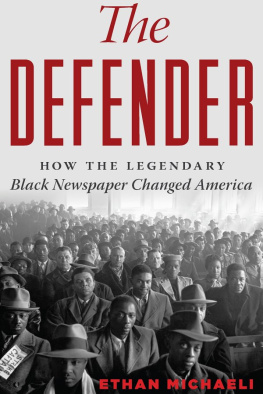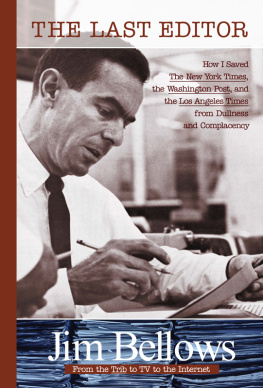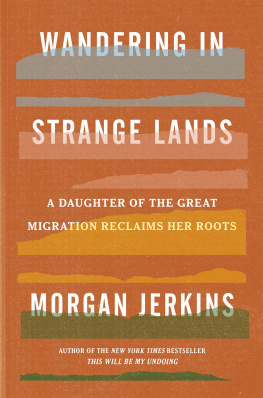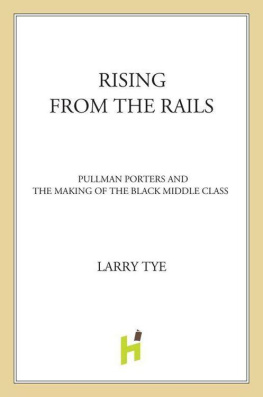Copyright 2016 by Ethan Michaeli
All rights reserved
For information about permission to reproduce selections from this book, write to trade.permissions@hmhco.com or to Permissions, Houghton Mifflin Harcourt Publishing Company, 3 Park Avenue, 19th Floor, New York, New York 10016.
www.hmhco.com
The Library of Congress has cataloged the print edition as follows:
Michaeli, Ethan.
The defender : how the legendary black newspaper changed America : from the age of the Pullman porters to the age of Obama / Ethan Michaeli.
pages cm
ISBN 978-0-547-56069-4 (hardback) ISBN 978-0-547-56087-8 (ebook)
1. Chicago defenderHistory. 2. African AmericansIllinoisChicagoNewspapers. 3. African American newspapersIllinoisChicagoHistory. 4. African American pressIllinoisChicagoHistory. I. Title.
PN 4899. C 395 D 55 2016
071.73'11dc23
2015017437
Cover design by Patrick Barry
Cover photograph courtesy Wayne Miller/Magnum Photos
v1.0116
For my beloved parents, Chana and Avri, who taught me with their words and deeds that all women and men are equal in talent and ability, and that there should be no borders between us.
Preface: Delphi on the Prairie
T HE SKIES WERE clear over the North American prairie on Saturday, August 14, 2004. A summer sun rose across the blue expanse of Lake Michigan and crept along the citys sandy beaches until it hit the glittering ridge of skyscrapers downtown and then filtered into the neighborhoods beyond.
Very early that morning, a stream of people began to converge on the citys South Side, on a tree-lined boulevard that had gone by several names in its long history but was now Martin Luther King Drive. Some walked, but mostly they came in cars, buses, and on the citys El trains. They came from all across the metropolitan area and well beyond, from the luxury high-rises dominating Chicagos coast and the Bungalow Belt neighborhoods on the South and West Sides, from stately homes in the suburbs, and from the housing projects nearby. A fair number arrived after long journeys from other states, from the South and the West Coast as well as New York and other points east.
By 10:00 a.m., more than a million people had gathered, nearly all of them African American. They filled the fairways, side lanes, lawns, and balconies of King Drive, setting up tents and grills on spots that many families had claimed every year for decades. It was the seventy-fifth year Chicagos black community had gathered for the Bud Billiken Parade, and everyone knew that this was a day set aside for wholesome fun and remembrance.
The Bud Billiken Parade was the brainchild of Robert Sengstacke Abbott, founder of The ChicagoDefender, the newspaper that had chronicled and catalyzed this communitys greatest accomplishments for nearly a century. At the height of the newspapers circulation and influence, Abbott had devised the parade to give African American children a sense of pride and dignity, and even three-quarters of a century later, there were still a few old-timers in the crowd who remembered him in his later years when, ravaged by illness but still impeccably dressed, he waved to the crowds from the balcony of his home, a brick-and-stone mansion that still stands on the parade route just south of Forty-Seventh Street.
For decades, the Billiken Parade, named for a long-forgotten figurine plucked at random from an editors desk, had attracted black Americas greatest celebrities and athletes, from Duke Ellington to James Brown, from Joe Louis to Muhammad Ali. Historically, the community had played a decisive role both as kingmaker and spoiler in innumerable campaigns for mayor, governor, senator, and even president.
It was a political tradition that went back to the days when African Americans voted Republican in honor of Abraham Lincoln, and continued through their conversion into New Deal Democrats. Even in the decades when the African American vote was suppressed in the rest of the country, Chicagos Bronzeville had elected their own sons and daughters as county officials, state legislators, aldermen, and congressmen. In more recent years, they had elected the citys first black mayor, Harold Washington, and Carol Moseley Braun, the nations first black woman U.S. senator. On this particular parade day, however, the community would get the chance to inspect a rising star unlike any they had propelled before: Barack Obama, a little-known state legislator and first-time candidate for the U.S. Senate, then just forty-three years old.
Three weeks earlier, Obama had delivered an electrifying keynote speech at the Democratic National Convention in Boston, and even though he had yet to win the upcoming race for the Senate, some were already urging him to seek the presidency. But victory in November would be determined by whether Chicagos black community would come out en masse to the polls, a reality that made this Billiken Parade nothing less than a crucial test of Obamas support.
Barack Obama and his wife, Michelle, cruised up Martin Luther King Drive on a float surrounded by a phalanx of hundreds of supporters in matching blue-and-white T-shirts, carrying signs emblazoned with OBAMA FOR SENATE . All along the parade route, the crowds roared as the candidate passed. At every point where he stopped to shake hands, the people erupted in chants of O-Ba-Ma, flashing homemade banners as well as official campaign signs.
Struck by the crowds enthusiasm, a television reporter, a veteran of many Billiken parades, asked the candidate when he disembarked for an interview, Where in the world did all these Obama signs come from?
We did pretty good on signage today, Obama answered, smiling cheekily.
Obamas eventual Republican opponent in the 2004 campaign, the former diplomat Alan Keyes, was also participating in the Billiken, though with decidedly different results. Not from Illinois and seriously underfunded, Keyes had been recruited by desperate Republicans
By 2004, the Billiken Parade was the most enduring part of Robert Abbotts legacy, though once upon a time he had built his newspapers circulation into the hundreds of thousands, with fiery editorials under giant red headlines that chastised southern whites for lynching and other atrocities. In the 1920s and 30s he was even dubbed the Moses of Black America for the role The Defender played in motivating the multitudes to leave Dixie for the Promised Land of Americas northern cities. Some sixty thousand came to Chicago during World War I alone, doubling the citys black population and ensuring that The Defenders hometown would become the nations center of African American politics, culture, and commerce. Ultimately, what Abbott referred to as the Great Northern Drive would live on in the nations consciousness as the Great Migration.
The early twentieth century was an era even more color-conscious than our own, and Abbotts dark complexion caused not only whites but many blacks to underestimate him. He met such racist assumptions head-on, with a keen intellect he had sharpened at Hampton College, the alma mater of Booker T. Washington, where he became a race man, part of a generation of activists who infused unwavering patriotism into their struggle for civil rights. Abbott preached and exemplified the American values of self-reliance and capitalist success, along with the constitutional gospel of freedom of speech and legal equality. Ignoring death threats and circumventing southern authorities who tried to ban his young newspaper, he drafted Pullman porters, the famed valets of the interstate train system, to smuggle bundles across the Mason-Dixon Line and sell subscriptions.
Abbott died in 1940 and was succeeded by his nephew John H. Sengstacke, who took The Defender to even greater heights during his five decades in command. During World War II, Sengstacke staffed the newspaper with an international, interracial roster of writers that included poet Langston Hughes and public intellectual W. E. B. Du Bois, turning it into a journalistic champion of universal human rights. In 1956 Sengstacke made
Next page





